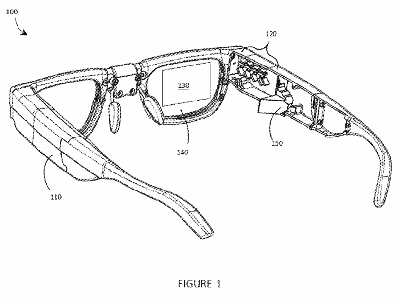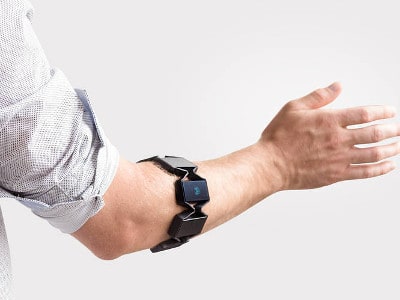
 Waterloo, Ontario wearable device company Thalmic Labs has filed a U.S. patent application relating to a new wearable head-up display, outlining a method for “eyebox expansion” which includes a scanning laser projector, a holographic combiner, and an exit pupil selector positioned in the optical path between the two.
Waterloo, Ontario wearable device company Thalmic Labs has filed a U.S. patent application relating to a new wearable head-up display, outlining a method for “eyebox expansion” which includes a scanning laser projector, a holographic combiner, and an exit pupil selector positioned in the optical path between the two.
United States Patent and Trademark Office application number 20160238845 is titled “Systems, devices, and methods for eyebox expansion in wearable heads-up displays”.
Until now, Thalmic Labs has concentrated exclusively on its Myo armband, a gesture control device that fits around a wearer’s forearm and reads myoelectric impulses in the wrist, allowing for the remote control of Bluetooth 4.0 enabled devices.
The patent was filed by Thalmic Labs Vice President of Advanced R&D Stefan Alexander, Thalmic Labs co-founder Matthew Bailey, Vance R. Morrison with the Center for the Physics of Materials at McGill University’s Department of Physics, and Mechanical Team Lead at Thalmic Labs, Lloyd Holland.
The eyebox expansion patent is a response to the need to provide high-quality images to the wearable user without limiting their ability to see the external environment.
Thalmic Labs acknowledges in the patent application the fact that Google Glass, the Optinvent Ora, the Epson Moverio, and the Sony Glasstron have all struggled to gain consumer acceptance as a result of being bulky, unfashionable, or just plain awkward looking.
“Independent of their performance limitations, many of the aforementioned examples of wearable heads-up displays have struggled to find traction in consumer markets because, at least in part, they lack fashion appeal,” reads the patent application. “Most wearable heads-up displays presented to date employ large display components and, as a result, most wearable heads-up displays presented to date are considerably bulkier and less stylish than conventional eyeglass frames.”
Thalmic Labs CEO Stephen Lake, in an article published in Information Age titled “Natural computing is the next step in human-computer interaction”, wrote that, “Wearable technology is only at the very beginning of what will be a massive shift in the way we interact with technology. Because of this, we feel as though technology is taking over our lives, but in truth we are still at the first stage of connecting computers with ourselves.”
In the article, Lake cites recent investments by technology giants in virtual reality technology, like Google’s $542 million investment in Magic Leap and Facebook’s $2 billion acquisition of Oculus Rift.
“Forget the cyborg vision of the future – we are on the cusp of developments that are much more subtle; more in tune with our human instincts so that with a flick of the wrist or a blink of the eye we can both summon and dismiss technology to suit our will and our individual requirements,” writes Lake.
A “flick of the wrist” is exactly the type of technology that Thalmic Labs has become known for with its wristband, but “a blink of the eye” would be new territory, which the company appears to be actively moving towards, if this patent application is anything to go by.
The Myo armband has found widespread acceptance in a variety of applications, including by researchers at Johns Hopkins University who used it to allow an amputee to control a robotic hand, by surgeons in Spain who are using Myo armbands to navigate medical slides while performing surgery, by researchers at Arizona State University who are using Myo armbands to translate American Sign Language, and by DJ Armin van Buuren who uses two Myo armbands to control the music and lights in his stage show.
Thalmic Labs was founded in 2012 by Stephen Lake, Matthew Bailey and Aaron Grant, all graduates of the University of Waterloo’s Mechatronics Engineering program.
In June 2013, Thalmic Labs closed a $14.5 million Series A round of funding, led by Spark Capital and Intel Capital.
Leave a Reply
You must be logged in to post a comment.




 Share
Share Tweet
Tweet Share
Share




Comment